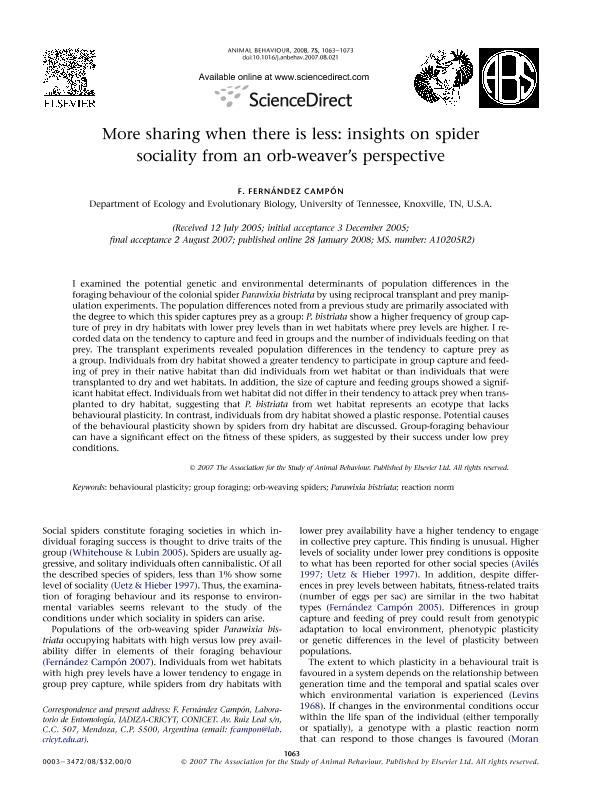Artículo
More sharing when there is less: insights on spider sociality from an orb-weaver's perspective
Fecha de publicación:
03/2008
Editorial:
Academic Press Ltd - Elsevier Science Ltd
Revista:
Animal Behaviour
ISSN:
0003-3472
Idioma:
Inglés
Tipo de recurso:
Artículo publicado
Clasificación temática:
Resumen
I examined the potential genetic and environmental determinants of population differences in the foraging behaviour of the colonial spider Parawixia bistriata by using reciprocal transplant and prey manipulation experiments. The population differences noted from a previous study are primarily associated with the degree to which this spider captures prey as a group: P. bistriata show a higher frequency of group capture of prey in dry habitats with lower prey levels than in wet habitats where prey levels are higher. I recorded data on the tendency to capture and feed in groups and the number of individuals feeding on that prey. The transplant experiments revealed population differences in the tendency to capture prey as a group. Individuals from dry habitat showed a greater tendency to participate in group capture and feeding of prey in their native habitat than did individuals from wet habitat or than individuals that were transplanted to dry and wet habitats. In addition, the size of capture and feeding groups showed a significant habitat effect. Individuals from wet habitat did not differ in their tendency to attack prey when transplanted to dry habitat, suggesting that P. bistriata from wet habitat represents an ecotype that lacks behavioural plasticity. In contrast, individuals from dry habitat showed a plastic response. Potential causes of the behavioural plasticity shown by spiders from dry habitat are discussed. Group-foraging behaviour can have a significant effect on the fitness of these spiders, as suggested by their success under low prey conditions.
Archivos asociados
Licencia
Identificadores
Colecciones
Articulos(IADIZA)
Articulos de INST. ARG DE INVEST. DE LAS ZONAS ARIDAS
Articulos de INST. ARG DE INVEST. DE LAS ZONAS ARIDAS
Citación
Fernández Campón, María Florencia; More sharing when there is less: insights on spider sociality from an orb-weaver's perspective; Academic Press Ltd - Elsevier Science Ltd; Animal Behaviour; 75; 3; 3-2008; 1063-1073
Compartir
Altmétricas




